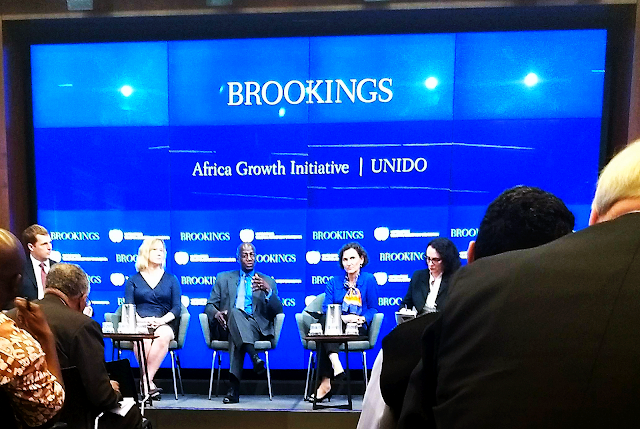Industry 4.0 in Africa: Helping or hindering? Papa Yaw Owusu, Impact Investing Intern, Creative Investment Research
On Monday, June 4, the Brookings Institution, in partnership with the United Nations Industrial Development Organization (UNIDO), held a panel discussion titled “Industry 4.0 in Africa: Helping or hindering?”. Industry 4.0 refers to the digitization of the manufacturing sector, driven by computing power, connectivity, and new forms of human-machine interaction, like artificial intelligence.
The panelists were Julius Akinyemi an Entrepreneur in Residence at MIT Media Lab, Mary Hallward-Driemeier the Senior Economic Adviser for Finance, Competitiveness, and Innovation at the World Bank, Susan Lund, Partner at the McKinsey Global Institute, and Olga Memedovic, the Chief of Business Environment, Cluster & Innovation Division in UNIDO's Department of Trade, Investment & Innovation. The panel addressed relevant issues and questions, such as: What can be done to put the prerequisites for Industry 4.0 adoption in place? What are the overall implications for Africa within the Industry 4.0 paradigm? How can Industry 4.0 be harnessed to improve the livelihoods of the continent’s most vulnerable people?
The panel began with the following assumption: that Africa needs improved infrastructure to be able to fully maximize the benefits of Industry 4.0. Excessive regulation accounts for about half of the continent’s investment gap. Less restrictive regulations, more competition in the procurement of infrastructure projects and more public-private partnerships would reduce this gap. There is a need for greater and cheaper access to internet technologies. Governments also need to implement appropriate policies to boost manufacturing and attract investment into their countries.
Industry 4.0 might have negative implications for the African continent. Industry 4.0, by reducing labor costs through automation, undermines Africa’s "cheap labor" competitive advantage. This may result in global value chains not moving to Africa as happened previously with the movement of global value chains from more economically developed nations to Asian countries. Furthermore, Industry 4.0 might create an even wider gap between African and other regions by leading to a greater cumulative competitive disadvantage.
Current developments on the continent suggest that Industry 4.0 has the potential to improve the lives of Africans. Greater internet access in most countries has enabled easier and more accurate data collection for governments thereby making government policies more appropriate. Industry 4.0 has enabled the development of various financial technology, like MPESA, which has lowered transactions costs. Finally, the possible development of the Africa Continental Free Trade Area (AfCFTA) would make Industry 4.0 more impactful by enabling greater economies of scale.
